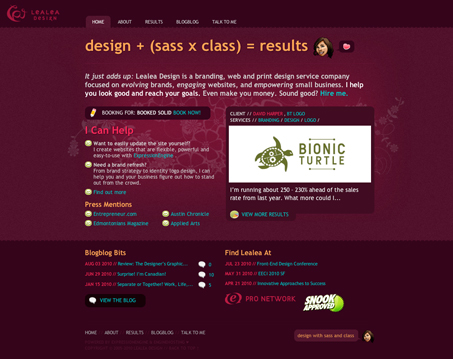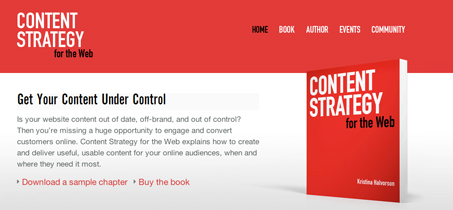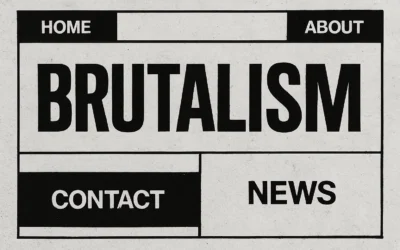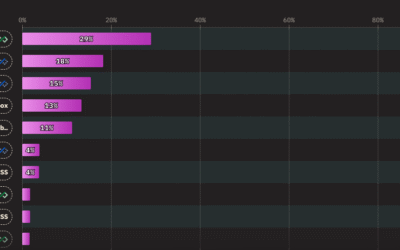We’ve talked with Lea Alcantara (@lealea) here on UMS before and featured her website in the past in the gallery and even discussed it an older podcast. So we’re big fans of Lea’s and admire her work. We recently ran into her at the Front End Design Conference in Florida and she was kind enough to stand in on a podcast with Julia.
Julia Anderson: Hi, I’m here with unmatchedstyle.com and this is Lea Alcantara. Did I say that right?
Lea Alcantara: It’s Al-can-tar-a but that’s OK.
Julia: Oh, right. [laughs] All right, and today you are talking about how to build a personal brand.
Lea: Yeah, art of self-branding.
Julia: Art of self-branding. And how important is having your own personal brand as a web designer?
Lea: I think it’s extremely important, whether you’re working for yourself or somebody else. Though if you are a freelancer or you’re working for yourself, it’s probably one of the most important things next to building your own skill set. I would almost argue that it probably is more important than your skill set.
Julia: All right, so, if I’ve been lazy about it and I’ve been trying to get over that hurdle of branding myself. Who am I? How do I transfer that over to the web? You’re saying: Go ahead and do that right on, just get over it. How would you get over that?
Lea: It’s really a mind shift over what do you do prioritize in regards to your career. And if you want to have same old, same old, then by all means keep doing whatever you’re still doing. But if you want to grow, if you want to do something better, you want to get more targeted clients, better clients, etc. and so forth, then it would behoove you to do something about it, which is work on your personal brand.
Julia: All right, and I thought it was really interesting your whole idea about asking your friends, and it’s what people think about you. So what your suggestion is is to go out and ask your friends?
Lea: Not just your friends, ask everyone. Ask someone that you just met at a conference, ask your friends, ask your family.
Julia: What do you think about me? [overlapping]
Lea: Exactly! Because you want to have different perspectives. For example, asking someone at a conference gives you the perspective of someone who just met you. Their first impression. So you get the example of first impression versus you ask your husband, wife or long-term best friend what they think of you. And you compare and contrast what you perceive of yourself versus someone who you just met. Which is first impressions versus someone who’s gotten to know you and knows everything about you.
The entire point is trying to figure out what’s the common ground here and how do I present that?
Julia: Yeah, I thought that was really interesting and again also the idea of looking at the surroundings and your closet. That one really does apply when I thought about it.
Lea: Yeah, it’s funny because we make a lot of subconscious decisions. Whether it’s how we move in our body language to how we speak and all the way to again: Oh, I really like this shirt! All these kind of things. And suddenly you’re going to see patterns in your own behavior, so why not bring that into your career? Why not use that because it is already there and express yourself.
Julia: All right, let’s turn a corner real quick and talk about what’s exciting you right now on the web, and where do you see personal branding going right now?
Lea: Well, what’s exciting me about the web these days is that people are being a lot more analytical. It’s become beyond the pretty. People are becoming more strategic when they are approaching websites. I’ve noticed because of that shift, that people and designers are having more analytical thinking, more business-related thinking which I think can only help our industry. Because I think part of what held back some of our designers and our industry is that some people don’t know how to explain the decision making that they’ve done, and that makes us look bad.
Because even though we understand that there are processes going on in our mind, the client doesn’t. And now that we have these strategies and these other implementations in place, now we can articulate in human terms and bring it all together to your client to understand which makes everyone happier, and then will make you reach a proper solution quicker as well, because now you have that type of language to go back and forth. So that’s pretty exciting.
Julia: All right, do you think there is a certain resource that you’re looking to, that you’re seeing that happens a lot with or a certain person?
Lea: I would like to say Kristina Halvorson (@halvorson) with her content strategy book.
Julia: Definitely a thing to follow for a web designer even though she’s a content strategist.
Lea: Yeah, well, I mean, everything on the web is content, right? Our job is to put that content together. So it’s really some kind of a marriage as opposed to a separation. Anyone that does work about the web I think should definitely check Kristina out.
Julia: That’s something to remember. All right, thank you.







I just found out about UMS from AwesomeJS’ thank you tweet.
UMS, you guys are a blessing. I can’t wait to share your website with my designers! Thank you.
Peace and Love,
Michael D Mooring
Lea, your site is boss. I find that because a lot of my friends are designers, their criticisms get in the way of anything getting done. Sometimes one confident designer is better than five overly critical ones.